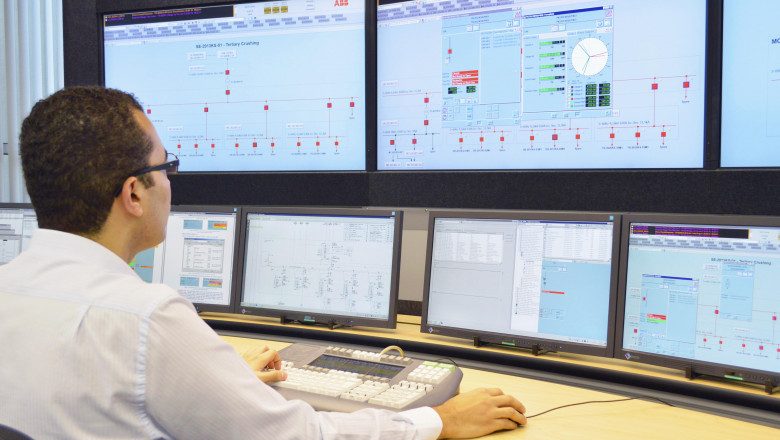views
The Distributed Control Systems market is undergoing a transformative shift as innovations in digital technology, data analytics, and industrial connectivity redefine how industries manage operations. As one of the cornerstones of industrial automation, DCS plays a vital role in controlling and monitoring complex processes across sectors such as oil & gas, chemicals, power generation, pharmaceuticals, and manufacturing. This article explores the market outlook for DCS from 2025 to 2030, with a focus on the innovations reshaping industrial automation and driving the next phase of growth.
Current Market Landscape
As of 2025, the global DCS market is valued at approximately USD 24 billion, with projections estimating a rise to USD 32 billion by 2030, growing at a CAGR of 5.8%. This growth is driven by a surge in smart manufacturing, digital transformation initiatives, and the integration of intelligent control technologies.
Large-scale industries are increasingly adopting DCS to achieve operational efficiency, real-time monitoring, safety, and system flexibility. However, the biggest changes are being brought about by technological innovations that extend the capabilities of traditional DCS far beyond basic automation.
Innovations Driving the Future of DCS
1. Industrial Internet of Things (IIoT)
The IIoT revolution is fundamentally reshaping the DCS market. By enabling devices, sensors, and control systems to communicate seamlessly, IIoT allows for:
-
Remote monitoring and diagnostics
-
Predictive maintenance
-
Real-time performance tracking
-
Process optimization through analytics
Modern DCS platforms are increasingly designed with IIoT integration at their core, allowing operators to make data-driven decisions and reduce downtime.
2. Artificial Intelligence and Machine Learning
AI and machine learning are bringing intelligence to automation. These technologies help DCS platforms:
-
Identify inefficiencies and anomalies
-
Predict equipment failures
-
Optimize energy use and resource allocation
-
Automate routine decision-making
For instance, AI-enabled DCS systems in the chemical industry can analyze reaction patterns to fine-tune parameters in real time, improving yield and reducing waste.
3. Edge Computing
Edge computing allows data processing at or near the source of generation, reducing latency and ensuring immediate response. In DCS, this is especially beneficial in mission-critical operations such as:
-
Power grid management
-
Refining and petrochemical operations
-
Water treatment facilities
Edge-enabled DCS platforms support real-time analytics, local decision-making, and greater autonomy—key for environments with limited connectivity.
4. Cloud-Based Distributed Control Systems
Cloud integration is emerging as a game-changer in industrial automation. Cloud-based DCS offers:
-
Scalability and flexibility
-
Centralized management of multiple sites
-
Lower total cost of ownership
-
Faster software updates and system upgrades
While security and latency remain concerns, hybrid cloud models are becoming increasingly popular, allowing sensitive data to remain on-premise while leveraging cloud benefits for analytics and reporting.
5. Open and Interoperable Systems
Traditional DCS architectures were proprietary and closed. Today, the demand is shifting towards open, interoperable, and vendor-neutral systems. The move to Open Process Automation (OPA) standards is encouraging a modular and plug-and-play approach to DCS, reducing vendor lock-in and fostering innovation through cross-platform compatibility.
DCS Use Case Evolution: From Control to Intelligence
The role of DCS is evolving from just controlling processes to becoming the nerve center of intelligent factories. New use cases include:
-
Sustainability Monitoring: Real-time emissions tracking and optimization of energy consumption to support ESG goals.
-
Digital Twin Integration: Simulating physical processes for better planning, training, and risk management.
-
Remote Plant Operations: Using cloud and IIoT to manage facilities in remote or hazardous environments with minimal on-site personnel.
These capabilities are transforming DCS into strategic tools that support broader business outcomes—not just operational efficiency.
Challenges and Considerations
Despite exciting innovations, the DCS market faces several challenges:
-
Cybersecurity threats in highly connected systems.
-
Integration complexity when merging legacy infrastructure with modern platforms.
-
Skills gap in operating and maintaining AI- and cloud-enabled control systems.
-
High initial costs in upgrading traditional systems, especially for small and medium-sized enterprises.
Vendors and end-users must address these issues proactively to fully capitalize on the potential of modern DCS solutions.
Outlook: A Smart and Sustainable Future
From 2025 through 2030, the DCS market is expected to experience a shift toward smart, scalable, and sustainable automation solutions. Industry leaders are focusing on:
-
Embedding cybersecurity at the core of DCS architecture.
-
Creating modular systems that are easier to upgrade and integrate.
-
Supporting net-zero initiatives through intelligent energy and emission control.
-
Enabling remote operations and global plant management via cloud connectivity.
As the fourth industrial revolution accelerates, DCS will remain a foundational technology, adapting and evolving to meet the demands of digital manufacturing, sustainable operations, and global competition.
Conclusion
The Distributed Control Systems market is on the cusp of a technological transformation. Innovations in IIoT, AI, cloud computing, edge processing, and open architectures are not only enhancing traditional capabilities but also redefining what’s possible in industrial automation.
By embracing these innovations, industries can future-proof their operations, improve decision-making, and build smarter, safer, and more efficient systems. As we move toward a fully connected industrial ecosystem, the evolution of DCS will be central to achieving the vision of intelligent and sustainable automation.






















Comments
0 comment